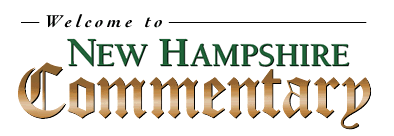

Access Dean Dexter's blog here.
CITIZENS OF LONDON The Americans Who Stood With Britain in its Darkest, Finest Hour
Review By DEAN DEXTER
To Franklin D. Roosevelt he was “Utopian John,” and high on his list to be the vice presidential running mate in 1944, which would have made this shy, awkward idealist the 33rd president of the United States, instead of Harry Truman, the choice of party bosses.
To Winston Churchill, he was an “inspiration,” a “friend of justice, freedom, and truth.” To the British people, as noted by the London Daily Express, he was “the personification of the finest part of America’s character.” Said the New Statesman, “Almost everyone in this country knows his name and respects him as a great American and as one of the best friends this country has ever had.” Another noted he “came to us in 1941 when we were in dire peril. He lived with us, suffered with us, and worked with us…He was with us, up to the neck, in our fight.”
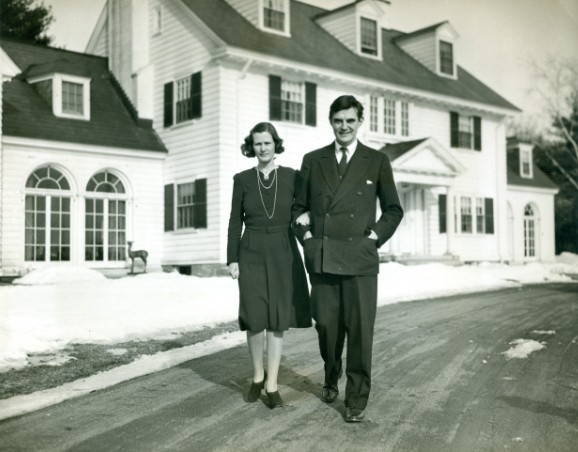
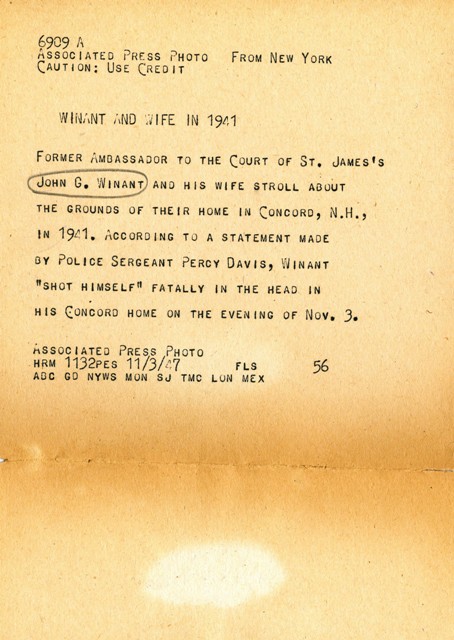
![]() Video: NH
Governor Hosts Forum for Lynne Olson and Rivington Winant
Video: NH
Governor Hosts Forum for Lynne Olson and Rivington Winant
To author Lynne Olson, in her book Citizens of London, the Americans who Stood with Britain in its Darkest, Finest Hour, John Gilbert Winant, was nothing less than the most important of several key figures, who helped forge the American-British alliance early in the Second World War, thus creating what has become known as the “Special Relationship” between the two nations. And once this Anglo-American alliance had been established, Winant played a vital role in keeping the fragile, fractious partnership, which included other allied powers and their bickering, jealous policy-makers and generals, together throughout the war.
Two other main characters profiled by Olson are better known. There is the legendary CBS newsman Edward R. Murrow, famous for his broadcasts from London during the war, particularly throughout the devastating bombing of the city during the German blitz, and the wealthy, ambitious former playboy, W. Averill Harriman, who as Lend-Lease Coordinator, often undermined Winant’s role as ambassador. One thing all three had in common, however, was love affairs with members of the Churchill family.
A former Moscow correspondent for the Associated Press, and White House correspondent for the Baltimore Sun, Lynne Olson has written several books on the World War II era, including co-authoring with her husband, Stanley Cloud, The Murrow Boys: Pioneers on the Front Lines of Broadcast Journalism, in 1996, and A Question of Honor: The Kosciuszko Squadron: Forgotten Heroes of World War II in 2003. She is also the author of Troublesome Young Men: The Rebels Who Brought Churchill to Power and Helped Save England, published in April 2007. Citizens of London is her fifth book.
The picture Olson portrays of Winant is that of a man unique in character and personality. Her portrait suggests a combination of both personal shortcomings and intangible gifting, working together in a curious way to propel this liberal, complicated dreamer into a position of significant influence on the world stage at a critical point in history.
Tall and dark, with an air of Lincoln about him, only handsome, Winant was the first to serve three terms as a New Hampshire governor, beginning in 1925. He was a liberal Republican, a charter member of the Progressive Movement nurtured by the 1912 third-party “Bull Moose” presidential candidacy of Theodore Roosevelt. Adding to his good looks and gracious manner was service in France as a fighter pilot during World War I, making him a perfect vote-getter.
While governor during the Great Depression, Winant’s compassion for people was routinely demonstrated by his giving of money from his own pocket to the poor and unemployed as he walked to his office at the State House. Concord city police had a standing order to take in any person who needed shelter overnight, and to feed them breakfast. The bills were sent to the governor, to be paid by Winant from personal, not state funds.
As the youngest and most progressive and reform-minded governor in the nation, Winant began to attract national attention as a possible Republican contender for the White House against Roosevelt in 1936, and even 1940. But that talk came to an end, along with his career in elective politics, the deeper Winant became involved in the New Deal, first as an appointee to the International Labor Relations Board (ILO), based in Geneva, then as the first head of the Social Security Board in 1936. His decisive break with the GOP came when he campaigned across the country against the Republican ticket, headed by Alf Landon, defending Social Security, which Landon was attacking. The Republicans in New Hampshire and in Washington, of course, disowned him.
Born into an upper-middle class, yet unhappy family in Manhattan’s Upper East Side, Winant was enrolled in Concord’s prestigious St. Paul’s School at the age of 12. He was an outstanding student leader, and loved to read history, but generally academics were a challenge, although he later taught history there.
Socially awkward and insecure, Winant was known as an indifferent and absent-minded administrator, and an embarrassingly poor public speaker, who could nevertheless connect with his audiences. Less known was the financial stress he was under after he lost most of his wealth in the Wall Street crash of 1929, as well as the rocky state of his marriage to a well-to-do New York socialite, with little interest in public affairs or politics.
Yet his gift for inspiring and lifting the spirits of people, the empathy he generated as he related to others were startling, even charismatic. As one woman in London said, by merely entering a room, Winant “made everyone feel better.”
While mentioning Winant as his possible running mate, Roosevelt told a meeting of his aides that Winant “could make the rottenest speech and yet when he finished, give the impression he was Abraham Lincoln.”
It is therefore singularly ironic that despite Winant’s difficulty in public speaking that he was chosen by the family to be the sole eulogist at FDR’s memorial service before a joint session of congress on July 1, 1946, attended by President Truman and Eleanor Roosevelt.
As a teacher and mentor at St. Paul’s, Olson writes: “In the evenings, his students would cram into his small, book-filled room to continue the discussions begun in the classroom. ‘Like most of the St. Paul’s boys of my generation, I admired John Gilbert Winant to the point of idolatry,’ said Tom Matthews, who thirty years later would become managing editor of Time magazine.”
By 1941, with Britain hanging on by a thread as the German army marched through Europe, but facing a strong isolationist sentiment in the U.S., Roosevelt hesitated to enter the war, despite constant pleas from Churchill, Winant from his post in Geneva, and others. With the unpopular, appeasement-minded Joseph P. Kennedy’s resignation as his envoy to London on his desk, Roosevelt needed a replacement who could relate to both the British conservative and labor parties, and above all, someone he could trust to be his eyes and ears abroad. Well known and popular in Europe through his work with the ILO, Winant was FDR’s choice.
Eschewing the handsome U.S. Ambassador’s mansion once owned by J.P. Morgan in favor of a small flat in the heart of London, near the U.S. Embassy, Winant would walk the streets of the city as it was being bomb during the Battle of Britain, seeking to assist people huddled among the wreckage and in the subway caverns, always asking, “How can I help?”
What Lynne Olson brings in her smoothly written, impressively researched work, is an inside view of the tensions and drama as American and British interests clashed, melded together, only to nearly fall apart as the war wore on. There is Winant and Harriman at Churchill’s country house, where they often spent weekends, when they heard news of the attack on Pearl Harbor. Not from a military aide or intelligence officer, but over a small radio as they were dining. Where was Murrow? At the White House with Roosevelt, drinking beer and eating sandwiches into the early morning hours, discussing what it would be like with America now in the war.
With Roosevelt’s death, and the war ended, Winant’s public career abruptly halted. Truman did not know him, so there was no significant role for him in the new administration, other than a relatively low post at the newly formed United Nations, far below Winant’s hope to become that body’s first secretary general. Winant’s counsel as the American member of a commission to create an orderly plan for a post-war Europe had been ignored by both FDR and Truman. Winant went home to New Hampshire in a sort of post partum depression to write his memoirs. He was exhausted, broke, his marriage in shambles, his serious relationship with Churchill’s daughter, Sarah, a closed book. On the night of November 3, 1947, after unsuccessfully attempting to meet with a clergyman friend the day before, Gil Winant took his own life in an upstairs bedroom at his Concord home. He was 58 years old.
The first volume of what was to be a three volume account of his war years, was sitting uncollected at the Concord post office.
With Citizens of London, Lynne Olson presents a dynamic picture of a city at the center of a world war. A place pulsating with an energy borne of fear, hunger, and death, but also of camaraderie and romance, even hope. There we find unique personalities and leadership qualities in Winant, Murrow, and Harriman, Eisenhower, FDR and Churchill, and others, who brought their various strengths to bear at a point in history that resulted in a great victory over tyranny, and in doing so saved the free world.
Citizens of London, the Americans who Stood with Britain
in its Darkest, Finest Hour, by Lynne Olson, published by Random House,
February 2009, 471 pages, including notes, bibliography and index.
![]() Lynne Olson
Website
Lynne Olson
Website
A version of this review first appeared in the 2010 Winter Edition of Historical New Hampshire, published by the New Hampshire Historical Society.
________________________________
Dean Dexter is a resident of Concord and Meredith, New Hampshire. An occasional writer, he was formerly active in local and state politics as a county commissioner and state legislator. He has served as a contributing editor of New Hampshire Magazine, and New Hampshire Assistant Secretary of State.
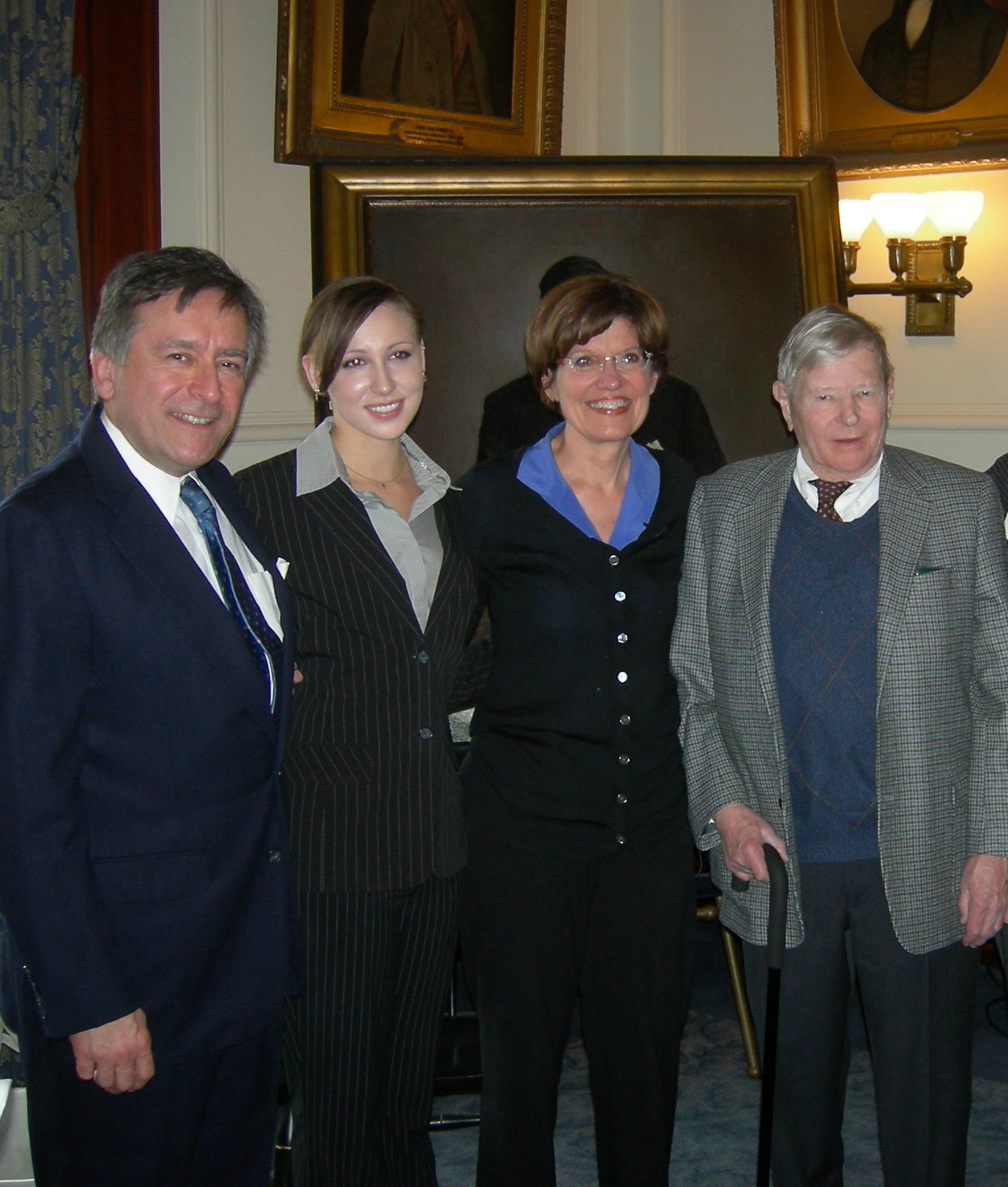
Dean Dexter and daughter Abigail Dexter with Lynne Olson and Rivington Winant son of the late New Hampshire Governor and U.S. Ambassador to London, John Gilbert Winant. Rivington served 28 years as treasurer of the United Nations. New Hampshire State House Governor's Reception, March 4, 2010.
_____________________________________________________
![]() See Video of Governor's 2010 reception for
Author Lynn Olson and Rivington Winant
See Video of Governor's 2010 reception for
Author Lynn Olson and Rivington Winant
_____________________________________________________
What if in the 1948 Election...?
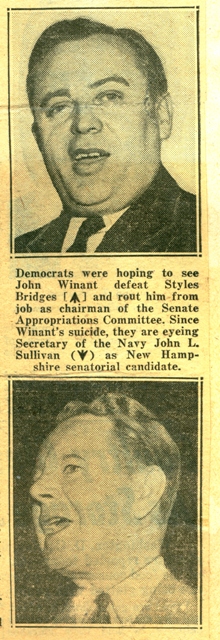
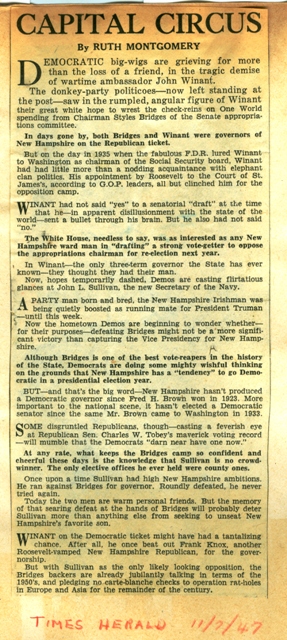
________________
Posted January 30, 2011
Return to NH Commentary Home Page
Copyright © 1996-2009 NHCommentary.Com
P.O. Box 706
Concord, NH 03302